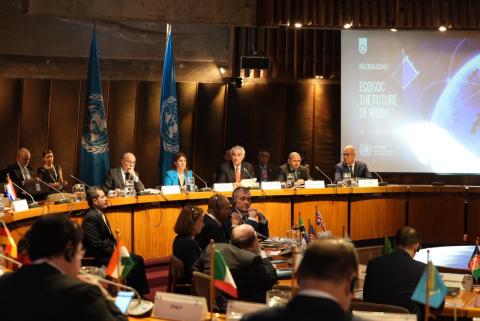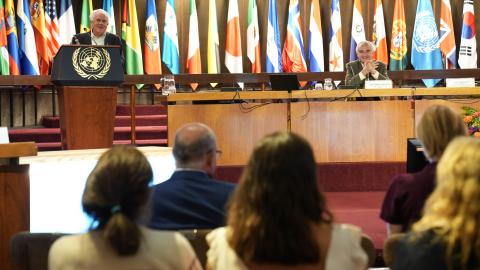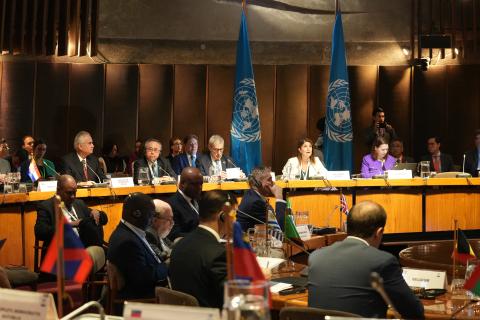News
Alberto van Klaveren, Minister of Foreign Affairs of Chile,
Ambassador Paula Narváez, President of the Economic and Social Council,
Alejandro Solano, Deputy Minister of Foreign Affairs of Costa Rica,
Distinguished representatives of the member countries of the Economic and Social Council and of ECLAC,
Colleagues from the United Nations system,
Friends,
I feel very fortunate, as do all my colleagues at the Economic Commission for Latin America and the Caribbean (ECLAC), to be able to celebrate the seventy-fifth anniversary of this Commission with you, in the context of this Economic and Social Council (ECOSOC) meeting. As you know, the Economic Commission for Latin America was established on 25 February 1948, by resolution 106 (VI), adopted at the sixth session of ECOSOC.
It was the brainchild of Hernán Santa Cruz, a Chilean lawyer and diplomat and at that time Chile’s Ambassador to the United Nations, who, with great foresight, presented and negotiated a successful draft resolution to create an economic commission for Latin America.
Thus, the Commission was born, as one of the five regional commissions of the United Nations, to collaborate with the governments of the region to improve lives and strengthen trade relations within the region and with the rest of the world.
Last November, we had the honour of welcoming the Secretary-General, António Guterres, to this room, where he highlighted the accomplishments of ECLAC and its important role at the forefront of thinking —particularly as a touchstone for development thinking— and in developing sustainable development policies for the region.
I would now like to take a few minutes to review some milestones in ECLAC thinking over the past seven decades, which I think is both apt and beneficial on the occasion of this meeting.
In its early days and in the 1950s, the Commission worked to achieve development in the region through State-led industrialization policies, as the most efficient means of disseminating technological progress, as part of trade between the “centre” and the “periphery” of the world economy. Industrialization in several countries in the region was a reality before it was policy, and was policy before it was theory. What the Commission did was to strengthen policy and develop theory. The emphasis on industrialization was justified, at least in those years, by the unique characteristics it offered in terms of driving adaptation of technology and dissemination of technological progress, as well as boosting productivity and technology appropriation in developing countries.
In the 1960s, an addition was made to the argument in favour of industrialization: a proposal to undertake institutional reforms —in the agriculture, fiscal and finance areas, among others— which were considered crucial for industrial deepening and further industrial development. However, in that decade, the Commission offered some criticisms of the form of import substitution industrialization (ISI) occurring at that time and underscored the importance of promoting industrial exports from the manufacturing sector. The Commission also did a great deal of work on two phenomena: high inflation and the external imbalance or restriction on development. This was also the decade in which the Commission made considerable contributions to the influential “dependency theory”, which further increased its global influence in the 1970s.
In the 1970s, the Commission’s thinking advanced along two main lines: the nature and difficulties of economic growth and industrial development, and income distribution. These and other ideas came together as a fairly comprehensive theory on the characteristics and challenges of “peripheral capitalism”, a concept coined by the Commission. The Commission also emphasized the “dynamic weakness” of capitalism in the periphery in terms of growth and job creation. In addition, in the 1970s the structural-historical approach was developed more explicitly as a way of producing theory based on reality, with a specific analytical structure. Lastly, criticisms were made, including self-criticisms, that marked a shift at ECLAC away from at least some versions of dependency theory, analysing the changes and opportunities in what was called “transnational capitalism”.
The severe economic and social crisis that affected most of the countries of the region in the 1980s led then Executive Secretary, Norberto González, to describe the period as “the lost decade”. During that decade, ECLAC analysed the debt crisis and ways to renegotiate debt, working on proposals for a more efficient and less demanding macroeconomic adjustment than the one that was taking place —an adjustment that would better drive growth— as well as on policies to mitigate the social costs of adjustment. In addition, the Commission produced in-depth studies of the export industrialization of South-East Asia, drawing lessons for industrialization in Latin America and the Caribbean.
In the 1990s, neostructuralism emerged within ECLAC, with the aim of modernizing ECLAC thinking, adapting to the changes of that decade, and raising its profile. In the new context, which many now call the period of hyperglobalization, with countries embracing commercial and financial globalization, ECLAC insisted that the guiding principle should be “changing production patterns with social equity”, ensuring a broad-based transformation of production, paying attention to potential harmful impacts of globalization and focusing on improving competitiveness within a framework of open regionalism. Part of the focus was on how to “reform the reforms” of what was known as the Washington Consensus of those years.
In the 2000s, neostructuralism had four pillars: macroeconomics and finance with an emphasis on countercyclical policies, international trade, social development, and environmental sustainability. These issues were were addressed in several influential publications. It was a heterodox approach in macroeconomic terms, developmentalist in terms of resource allocation and State intervention, universalist in the social sphere and conservationist in environmental matters. ECLAC called for balancing of the asymmetries of globalization, to achieve development based on changes in production patterns, equitable distribution and social protection and cohesion.
Although concern for equality has formed part of the thinking of ECLAC throughout its history, it played a central role in the 2010s, as set out and established in the set of documents known as “the equality trilogy”. The driving ideas of ECLAC in that decade were to promote sustainable development through progressive structural change, an environmental big push, and compacts for equality on the basis of the 2030 Agenda. Gender equality and the care society were also priorities.
The transition to the 2020s has been dominated by the cascading crises that have afflicted the region and the world since the pandemic in 2020. As a result, much of the Commission’s attention has been focused on analysing the impacts of the cascading crises and on dialogue with governments and other key stakeholders on how to manage the repercussions. ECLAC has also analysed issues such as changes in globalization, geopolitics, the technological revolution, climate change and migration.
Looking at development challenges from a medium- and long-term perspective, our analysis is that the region is in the midst of a real development crisis, reflected in three main traps or “syndromes”:
- A low-growth trap: from 2014 to 2023, the region grew at an average rate of only 0.8%, less than half the 2% registered in the lost decade of the 1980s. Our message or recommendation is that it is urgent for countries to scale up pro-growth and productive development efforts.
- A high-inequality trap, exacerbated by six root causes: low growth; shortcomings in education and job training; gender inequality; slow job growth; regressive tax systems; and weak social policy. Our recommendation, then, is for countries to adopt, as a matter of urgency, a holistic view of these root causes of inequality and low social mobility and inclusion, and take comprehensive action thereon.
- A trap of low institutional capacity and weak governance that makes it difficult to address the enormous development challenges ahead. We have reiterated that it is not enough to simply conduct analyses and indicate “what” must be done; focus must be placed on “how” it must be done, and we are working more systematically on how to improve public policy governance and build institutions’ technical, operative, policy and foresight capacities, as well as mobilize financing.
In short, the major development challenge for the countries of the region today is how to move forward in building a more productive, inclusive and sustainable future. These were the three main objectives and areas of work adopted in our seventy-fifth anniversary motto. The question is how to achieve this in the light of current geoeconomics and geopolitics.
As part of this construct, we have identified eleven major transformations of the development model as well as a set of sectors that drive higher, sustained, inclusive and sustainable growth and accelerate progress and transitions towards the SDGs. These are areas for investment, partnership and international cooperation.
With respect to the 2030 Agenda, we are working closely with the entire United Nations system at the regional level on the Regional Collaborative Platform for Latin America and the Caribbean (RCP LAC) and at the country level in support of the resident coordinators and country teams.
I can assure you that the 75-year history of ECLAC and its contributions over that time, which I have just summarized, inspire us every day to work with diligence and a strategic approach, to support countries in building a more productive, inclusive and sustainable future.
Above all, we are fully aware that we are standing on the shoulders of giants, something we cannot forget even for one second; firstly Ambassador Hernán Santa Cruz, secondly Raúl Prebisch, and with them a long list of thought leaders and pioneers of action. We are also supported by teams of dedicated staff members, who share the same aspirations and convictions regarding our development models, guided by the principles of peace and democracy.
Thank you very much.


